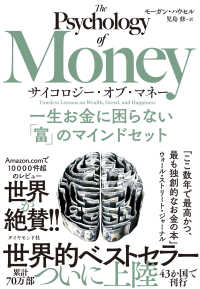- ホーム
- > 洋書
- > 英文書
- > Business / Economics
Full Description
Awareness of the essential skills required for thriving in the job market is necessary for educators and employers. Shedding light on the role of industry in promoting work-based learning, Technological Innovations for Business and Education Sustainability considers how technology has both transformed the business landscape, and how it might continue to do so in future.
Harnessing the potential of innovative Industry 4.0 technologies such as the Internet of Things (IoT) and Artificial Intelligence (AI) for sustainable business models, contributors rethink core skills required to meet the changing needs of the work environments in terms of modes of education and workplace ethics, as well as the implications of these constantly evolving technologies for employers and workplaces. Chapters analyse in detail how rapidly advancing technologies have already affected recruitment, retail, banking, the oil and gas industry, insurance, financial services, advertising, childhood obesity, human resources and organizational management, small- and medium-sized enterprises (SMEs), cloud computing and more.
Fulfilling a growing need for aligning business strategy and educational curriculums with the evolving skills required for business workplaces, Technological Innovations for Business and Education Sustainability presents a thorough understanding of how business, education and technology can enable current and future leaders to contribute positively to the digital transformation currently in play across the globe.
Contents
Part I. Business Intelligence, Technology for Sustainability
Chapter 1. Artificial Intelligence and Marketing: Challenges and Opportunities; Ali Makhlooq and Muneer Al Mubarak
Chapter 2. Digital Resources and Social Skills Development for Credit Analysts in Banks Focused on Green Finance; Nilda Barrutia-Montoya, Huber Rodriguez-Nomura, Jaheer Mukthar K.P, Jose Rodriguez-Kong, and Abraham Jose García-Yovera
Chapter 3. Digital Transformation: A Catalyst for Sustainable Business Practices; Maha Shehadeh
Chapter 4. An innovative web intelligence data clustering algorithm for human resources based on sustainability; Emerson Norabuena-Figueroa, Roger Rurush-Asencio, Jaheer Mukthar K.P, Jose Sifuentes-Stratti, and Elia Ramírez-Asís
Part II. Technological Education and Skills Development for Sustainable Practices
Chapter 5. Blockchain Technology and Virtual Asset Accounting in the Metaverse; Heba Hikal, Marwan Altarawneh, Ahmad AL-Hawamleh, Zaid Jaradat, and Alya Elfedawy
Chapter 6. Stakeholders' Perceptions of Sustainability Accounting Education: A literature review; Huthaifa Al-Hazaima, Hashem Alshurafat, Mohannad Obeid Al Shbail, and Husam Ananzeh
Chapter 7. A Symphony of Insights: Orchestrating Business and Education Research with Google Bard; Omar Arabiat
Chapter 8. Interpersonal Competence and Teaching Quality in a Sustainable Public University; Mercedes Huerta-Soto, Karin De la Cruz Inchicaqui, Hugo Marino Rodríguez-Orellana, Orlando Leiva-Chauca, and Hernan Ramirez-Asis
Chapter 9. EdTech Tools for Sustainable Practices: A Green Revolution in Education; Jais V Thomas, Mallika Sankar, Deepika S R, Nagarjuna G, and Arjun B. S
Chapter 10. Gap Analysis of Employability Attributes Among Job Seekers in Bahrain: Employee Perspective; Nawal Abdulla, Mukthar Al-Hashimi, Noor Alsayed, and Hashim Al-Hashimi
Chapter 11. Digital competencies and attitude towards the use of information technologies in secondary school teachers in a Peruvian Public Educational Institution; Edwin Ramirez-Asis, Hober Huaranga-Toledo, Yeni Bullón-Miguel, Huber Rodriguez-Nomura, and Hugo Marino Rodríguez-Orellana
Chapter 12. Effect of Business Intelligence Applications on the Contribution of Accounting Departments at Jordanian Universities in Developing University Accounting Education and its Quality Assurance; Walid Zakaria Siam and Hashem Alshurafat
Part III. Digital technologies, Economic Diversification, Entrepreneurial Capacities and Sustainability
Chapter 13. Building productive capacity for economic diversification in the gulf region; Amer Al-Roubaie and Bashar Matoog
Chapter 14. Assessing the Sustainability of GCC Economic Growth: A Proposed Theoretical Framework; Fahad Khaled Alkhaldi and Mohamed Sayed Abou Elseoud
Chapter 15. Emotional intelligence, job satisfaction and work engagement at a Public University; Martha Esther Guerra Muñoz, Rober Trinidad Romero Ramirez, and Freddy David Zuluaga Guerrra
Chapter 16. Entrepreneurial capabilities and survival of micro-entrepreneurs in rural Peru; Edwin Hernan Ramirez Asis
Chapter 17. Socio-economic factors and financial inclusion in the Department of Ancash, Peru in 2015 and 2021; Hernan Ramirez-Asis, Jorge Castillo-Picon, Jenny Villacorta Miranda, José Rodríguez Herrera, and Walter Medrano Acuña
Chapter 18. Board structure and financial performance: A survey to directors' perception; Fadi Shehab Shiyyab, Abdallah Bader Alzoubi, and Leena Abdelsalam Almajaly
Chapter 19. Human development based on the competitiveness of the Peruvian region of Ancash, 2008-2021; William Dextre-Martinez, Rosario Huerta-Soto, Eduardo Rocca-Espinoza, Manuel Chenet-Zuta, and Luis Angulo-Cabanillas
Chapter 20. Female Education and Economic Growth in Egypt: An Empirical Study; Samar H. AlBagoury
-

- 電子書籍
- サイコロジー・オブ・マネー - 一生お…



